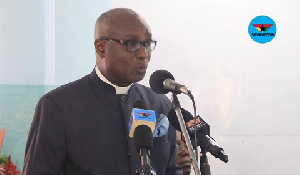- Home - News
- Polls
- Year In Review
- News Archive
- Crime & Punishment
- Politics
- Regional
- Editorial
- Health
- Ghanaians Abroad
- Tabloid
- Africa
- Religion
- Election 2020
- Coronavirus
- Photo Archives
- News Headlines
- Press Release
General News of Tuesday, 2 November 2021
Source: mynewsgh.com
Kicking, stripping people to cast out demons alien to Christianity – Theologian
A renowned theologian with the Trinity Theological Seminary at Legon, Rev. Prof Johnson Kwabena Asamoah-Gyadu has spoken against physical abuse meted out by some prophets and religious leaders in the country all in the name of Christianity.
“You see them sometimes kicking people, others stripping people naked, stepping on the bellies of pregnant women….So it’s almost like religion or Christianity, which is something that’s to build, has become a nuisance,” he noted.
Speaking on JoyNews’ Newsfile over the weekend, Rev. Prof Johnson Kwabena Asamoah-Gyadu bemoaned the fact that some pastors, especially those who identify themselves as prophets, engage in various acts which are not in line with the doctrines of Christianity in the name of casting out demons or carrying out the instructions of God.
His views come on the back of Inspector-General of Police (IGP), Dr. George Akuffo Dampare's move to crack the whip on prophets whose prophesies are causing fear and panic in the country
“…If you read the theology of prophecy, from what Paul says, is to encourage, strengthen, it shouldn’t be a source of nuisance to the public,” he told the host.
Meanwhile, Private Legal Practitioner Ace Ankomah has warned that prophets whose prophecies are likely to cause or actually cause fear and panic(alarm) could be jailed, stressing that the prophets cannot defend themselves by saying that God told them or revealed the information to them.
Speaking on Saturday, October 30, 2021, on the same programme, Mr Ankomah explained that section 208(1) of the Criminal Code criminalizes the publication of false statements, rumours, or reports that are likely to cause fear and alarm to the public or disturb the public peace when the person involved knows or had reason to know the what they published is false.
He noted that “false” has to do with whether or not the person took reasonable steps to verify the accuracy of what they published.
“…That you say this person is going to die. Death is not good news…And so if you do that, then the law will say: “well, how were you able to verify the veracity or accuracy of it.
Now in court, it says you must prove. “Prove” by the Evidence Act means testimony, writings, material objects, or other things presented to the senses that are offered to prove the existence or non-existence of a fact.
And so if it cannot be seen, heard, smelt, tasted, or touched it is not evidenced unless it is opinion evidence,” he said.
“And so with due respect, prophets, ‘Nyame ne yi kyere me; mi su day3 – God told me -is not evidence in Court. So receive the message but how you deal with it, how you handle it [will determine whether or not you’ve will breach the law]” he said.
Entertainment










